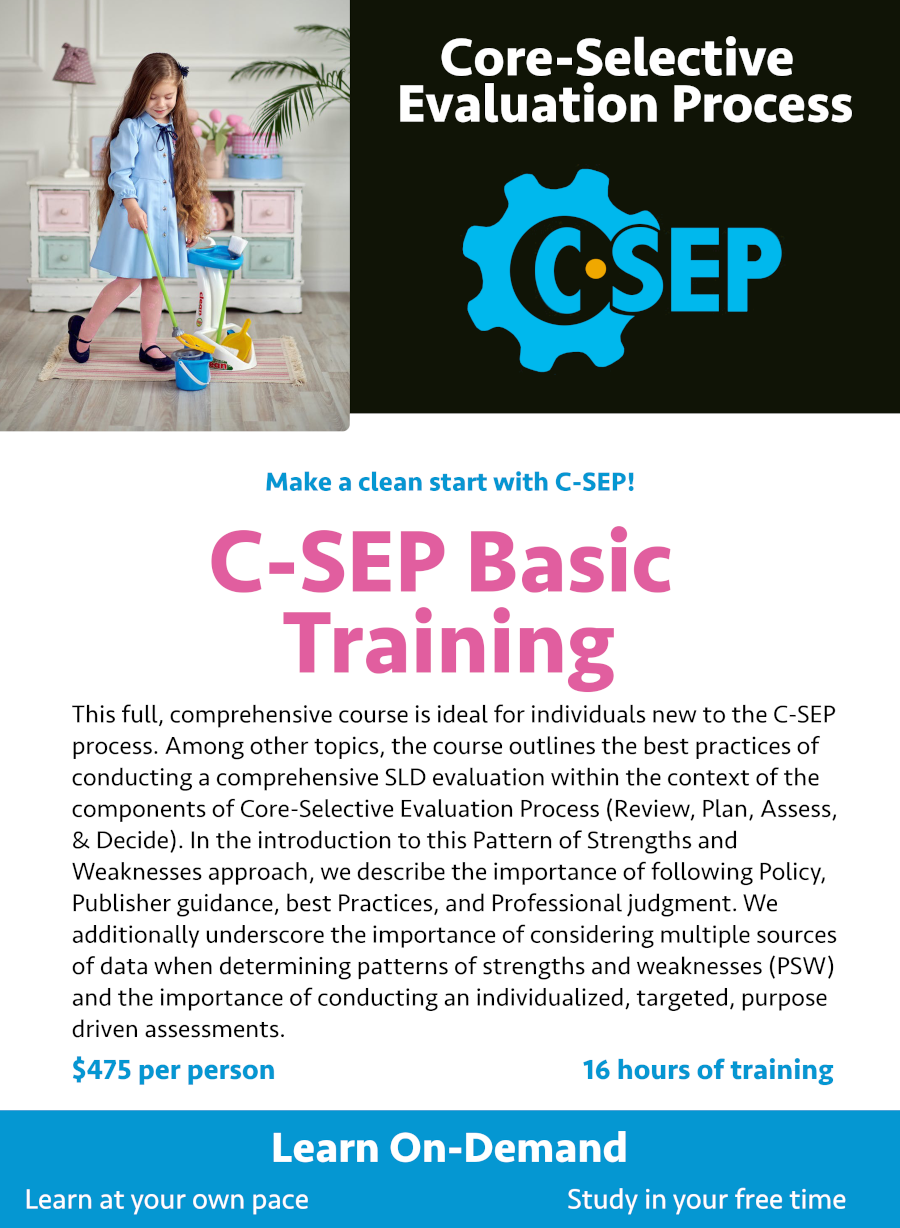Module 1: Introduction to the Core-Selective Evaluation Process (C-SEP)
Level(s): Beginning, Intermediate
The Core-Selective Evaluation Process (C-SEP) was conceptualized and recently introduced into the field.
This approach to SLD identification is a third-method pattern of strengths and weakness (PSW) approach rooted in contemporary CHC theory and features the application of professional judgment, integrated data analysis techniques, and the use of statistical support to help guide decisions. The organizational framework of C-SEP is a set of sound educational practices logically interwoven to provide the most comprehensive, statistically sound, and legally defensible assessment of SLD. This presentation will further describe the organizational framework of C-SEP, distinguish C-SEP from other methods, and provide an illustration of this model using a case study.
Module 2: Targeted Assessment: Data Collection, Organization, and Establishing a Focused Referral Question
Level(s): Beginning, Intermediate
A key component of conducting a targeted assessment using C-SEP involves gathering, organizing, and analyzing multiple sources of data. This module will focus on key recommendations for organizing the data and conducting preliminary analysis of patterns of strengths and weaknesses, ruling out exclusionary factors, and establishing a focused referral question to be used to plan a targeted assessment plan.
Module 3: Language: An Integral Part of C-SEP
Level(s): Beginning, Intermediate
Language plays a key role in academic performance and should be considered when assessing student’s strengths and weaknesses. The C-SEP model requires a student’s language be assessed either informally or formally. It is vital that language be ruled out as a primary cause of struggle for every student. When language is found to be a concern, the evaluator must investigate its impact on the student’s learning.
Module 4: Considering and Ruling Out Exclusionary Factors
Level(s): Beginning, Intermediate
This session covers the importance of considering Exclusionary Factors and their impact on SLD identification and the role of documentation in our reports. Included in the presentation is a brief review of the Exclusionary Factors identified in federal and state law and the impact of societal changes: social, economic, cultural and technology related.
Module 5: Pattern Seeking Techniques for SLD Identification: An Integral Part of C-SEP
Level(s): Beginning, Intermediate
Pattern seeking techniques are a key aspect of the C-SEP framework. Evaluators must be able to organize, integrate, and interpret multiple sources of data in order to establish patterns of strengths and weaknesses. This is a refresher session focusing on pattern seeking techniques, using publisher guidance to analyze and interpret standardized tests results through the triangulation of multiple data sources. Finally, a discussion of the role professional judgment plays throughout the process will be discussed.
Module 6: Task Demands Analysis
Level(s): Beginning, Intermediate, Advanced
A key component of conducting a targeted assessment using C-SEP involves gathering, organizing, and analyzing multiple sources of data. Task Demands Analysis (TDA) helps to explain a student’s performance. Using case studies, this session illustrates how an evaluator can go “Beyond the Scores” TDA. This practice will improve the quality and efficiency of your assessment while allowing you to extrapolate more meaningfully interpretations from your findings.
Module 7: Writing a Legally Defensible Report Using C-SEP
Level(s): Beginning, Intermediate
Understanding how to organize and present assessment data obtained through the use of the C-SEP framework is important. This session will focus on writing legally defensible reports using the C-SEP framework. The presenters will highlight the organization of a Full Individual Evaluation (FIE) and review the key components. Sample write-ups will be provided to illustrate the presentation of data. Participants will have the opportunity to practice writing student descriptions beyond the standard score interpretation. The importance of utilizing task analysis and integrating findings will be demonstrated. Adherence to the policy requirements will be addressed.
Module 8: Using the C-SEP Framework for Dyslexia Evaluations (full/half day offerings)
Level(s): Beginning, Intermediate
This session will define the Core-Selective Evaluation Process (C-SEP) and explain how it can be used when assessing for dyslexia. Participants will explore important considerations when conducting dyslexia assessments and examine the application of the tenets of C-SEP to dyslexia assessment.
C-SEP Hands-On Practice (half/full-day offerings)
Level(s): Intermediate, Advanced
Practice makes perfect! Engage in hands-on training under observation so that attendees can become for confident in applying C-SEP methodology. This guided and flexible training can include case studies and/or participants can bring their own cases. Among other things, you#ll practice combining nad triangulating data, as well as practice exercising your professional judgement.








